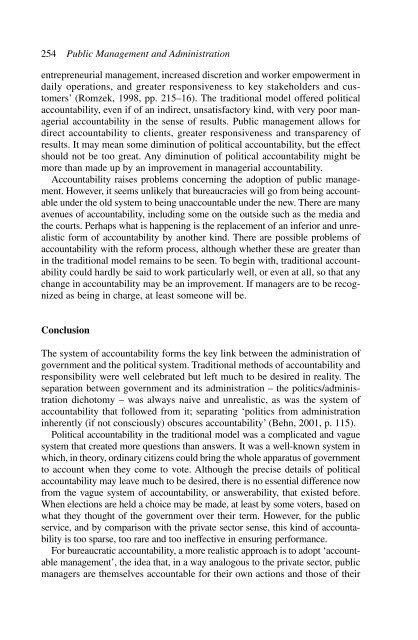Public Management and Administration - Owen E.hughes
Public Management and Administration - Owen E.hughes
Public Management and Administration - Owen E.hughes
Create successful ePaper yourself
Turn your PDF publications into a flip-book with our unique Google optimized e-Paper software.
254 <strong>Public</strong> <strong>Management</strong> <strong>and</strong> <strong>Administration</strong><br />
entrepreneurial management, increased discretion <strong>and</strong> worker empowerment in<br />
daily operations, <strong>and</strong> greater responsiveness to key stakeholders <strong>and</strong> customers’<br />
(Romzek, 1998, pp. 215–16). The traditional model offered political<br />
accountability, even if of an indirect, unsatisfactory kind, with very poor managerial<br />
accountability in the sense of results. <strong>Public</strong> management allows for<br />
direct accountability to clients, greater responsiveness <strong>and</strong> transparency of<br />
results. It may mean some diminution of political accountability, but the effect<br />
should not be too great. Any diminution of political accountability might be<br />
more than made up by an improvement in managerial accountability.<br />
Accountability raises problems concerning the adoption of public management.<br />
However, it seems unlikely that bureaucracies will go from being accountable<br />
under the old system to being unaccountable under the new. There are many<br />
avenues of accountability, including some on the outside such as the media <strong>and</strong><br />
the courts. Perhaps what is happening is the replacement of an inferior <strong>and</strong> unrealistic<br />
form of accountability by another kind. There are possible problems of<br />
accountability with the reform process, although whether these are greater than<br />
in the traditional model remains to be seen. To begin with, traditional accountability<br />
could hardly be said to work particularly well, or even at all, so that any<br />
change in accountability may be an improvement. If managers are to be recognized<br />
as being in charge, at least someone will be.<br />
Conclusion<br />
The system of accountability forms the key link between the administration of<br />
government <strong>and</strong> the political system. Traditional methods of accountability <strong>and</strong><br />
responsibility were well celebrated but left much to be desired in reality. The<br />
separation between government <strong>and</strong> its administration – the politics/administration<br />
dichotomy – was always naive <strong>and</strong> unrealistic, as was the system of<br />
accountability that followed from it; separating ‘politics from administration<br />
inherently (if not consciously) obscures accountability’ (Behn, 2001, p. 115).<br />
Political accountability in the traditional model was a complicated <strong>and</strong> vague<br />
system that created more questions than answers. It was a well-known system in<br />
which, in theory, ordinary citizens could bring the whole apparatus of government<br />
to account when they come to vote. Although the precise details of political<br />
accountability may leave much to be desired, there is no essential difference now<br />
from the vague system of accountability, or answerability, that existed before.<br />
When elections are held a choice may be made, at least by some voters, based on<br />
what they thought of the government over their term. However, for the public<br />
service, <strong>and</strong> by comparison with the private sector sense, this kind of accountability<br />
is too sparse, too rare <strong>and</strong> too ineffective in ensuring performance.<br />
For bureaucratic accountability, a more realistic approach is to adopt ‘accountable<br />
management’, the idea that, in a way analogous to the private sector, public<br />
managers are themselves accountable for their own actions <strong>and</strong> those of their











